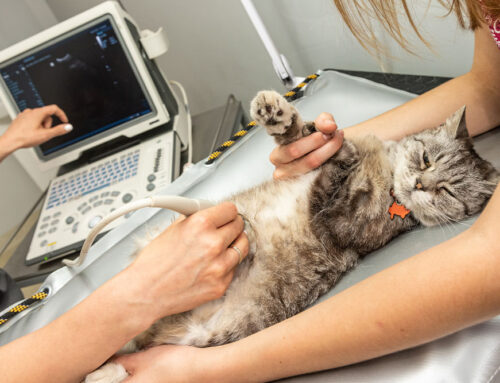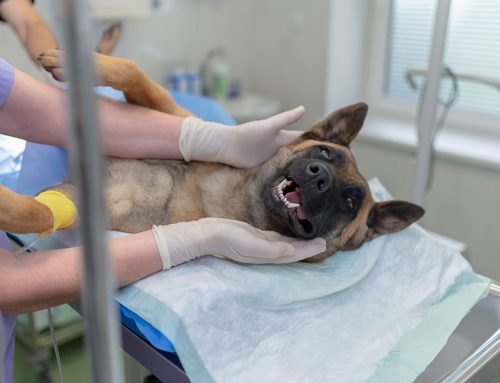Our homes are filled with items that make our lives easier and more enjoyable, but some of these common household items can be dangerous, even deadly, for our pets. At Burlington Veterinary Center, we want to help you keep your furry companion safe by highlighting some everyday items that pose potential risks.
Foods that are toxic to pets
While it may seem harmless to share a bite of your dinner with your furry friend, many seemingly innocuous human foods can be highly toxic, even deadly, for pets. Here are some common culprits to be aware of:
- Chocolate — This sweet treat contains theobromine, a stimulant that can cause vomiting, diarrhea, tremors, seizures, and even death in pets. The darker the chocolate, the higher the concentration and the greater the risk. Even small amounts can be harmful, especially for smaller dogs.
- Grapes and Raisins — The exact toxin responsible for their toxicity is unknown, but both grapes and raisins can cause kidney failure in dogs, even in small quantities. This risk applies to all grape varieties, including red, green, and seedless.
- Onions, Garlic, and Chives — These vegetables contain compounds called N-propyl disulfide, which can damage red blood cells, leading to anemia. Symptoms can include lethargy, weakness, pale gums, and dark-colored urine.
- Macadamia Nuts — Highly toxic to dogs, even small amounts of macadamia nuts can cause tremors, vomiting, weakness, and overheating. These symptoms can be severe and require immediate veterinary attention.
- Xylitol — This sugar substitute, often found in sugar-free gum, candy, and baked goods, can cause hypoglycemia (low blood sugar) and liver damage in dogs. Even small amounts can be problematic, so be vigilant about checking ingredient lists.
When in doubt, never share your food with your pet. Stick to pet-safe treats and meals formulated for their specific dietary needs.
Household cleaners that are toxic to pets
Many cleaning products contain harsh chemicals that can irritate or even poison your pet if ingested or inhaled. These seemingly ordinary products can harbor hidden dangers:
- Bleach and Ammonia — These powerful cleaning agents can cause severe respiratory problems, vomiting, and burns if ingested or inhaled. Even fumes from these products can be harmful, so ensure proper ventilation when using them.
- Toilet Bowl Cleaners — The harsh chemicals in these cleaners can irritate the mouth, throat, and stomach, leading to vomiting, diarrhea, and abdominal pain. Keep these products locked away and out of reach of curious pets.
- Laundry Detergents and Fabric Softeners — These products often contain surfactants and fragrances that can cause vomiting, diarrhea, and skin irritation if ingested or if they come into contact with your pet’s skin. Opt for pet-safe laundry products or store regular ones securely.
- Insecticides and Pesticides — These products are designed to kill pests, and they can be just as dangerous to your pet. Ingestion or absorption through the skin can lead to tremors, seizures, and even death. Always follow the instructions carefully and keep these products out of reach of pets.
Medications that are toxic to pets
Human medications, even over-the-counter ones, can be extremely dangerous for pets due to their different metabolisms and sensitivities. Here are some common culprits that pose a significant risk:
- Pain Relievers — Acetaminophen (Tylenol) and ibuprofen (Advil) can be fatal to cats and dogs, even in small doses. These medications can cause liver damage, kidney failure, and stomach ulcers.
- Antidepressants — These medications can cause seizures, tremors, and other neurological problems in pets. Never share any antidepressants, even if they seem like a harmless dose.
- Heart Medications — These medications can disrupt your pet’s heart rhythm and lead to serious complications, including heart failure. Always stick to veterinarian-prescribed medications for your pet’s specific needs.
Never give your pet any medication not prescribed by a veterinarian, regardless of how harmless it may seem. Consulting a professional is crucial to ensure your pet’s safety and well-being.
Beyond the Obvious — Other Potential Hazards Lurking in Your Home
Other seemingly harmless items can pose a threat to your pet and are often overlooked due to their everyday nature:
- Batteries — The acid inside batteries can cause severe burns and internal injuries if ingested. Keep all batteries out of reach and dispose of them properly.
- String and Yarn — These seemingly harmless materials can be swallowed, leading to intestinal blockages, which can be life-threatening if not treated promptly. Supervise your pet when they play with stringy toys and keep yarn balls stored away.
- Glow Sticks — The chemicals inside glow sticks can cause vomiting, irritation, and even chemical burns if ingested. Avoid letting your pet chew on these items and dispose of them properly after use.
- Houseplants — Many common houseplants, like lilies, tulips, and sago palms, are toxic to pets. Ingestion can cause vomiting, diarrhea, tremors, and even organ failure. Research the toxicity of any plants before bringing them into your home and keep them out of reach of curious pets
- Coins and Jewelry — Small objects like coins, buttons, and jewelry can be swallowed, posing a choking hazard or intestinal blockage. Keep these items out of reach and supervise your pet when they play with small toys.
Protecting your pet from common toxins

By being aware of these common household dangers, you can take steps to create a safe and healthy environment for your furry companion. Here are some additional pet-proofing tips:
- Pet-proof your home — Secure cabinets, keep cleaning products locked away, and pick up toys and other small objects. Consider using childproof latches and gates to restrict access to certain areas.
- Supervise your pet — Don’t leave your pet unattended around potentially dangerous items, especially when they are young or prone to chewing or exploration.
- Know the signs of poisoning — Watch for signs like vomiting, diarrhea, lethargy, seizures, or difficulty breathing. These can be indicators of accidental poisoning and require immediate veterinary attention.
- Act quickly — If you suspect your pet has ingested something toxic, don’t hesitate. Call Burlington Veterinary Center or the Pet Poison Helpline (1-888-426-4435) immediately. The sooner you act, the better the chance of a full recovery.
Prevention is key. By taking these proactive steps and being mindful of the potential dangers lurking in your home, you can keep your pets safe and happy. We are committed to providing compassionate and expert care for your pet. Don’t hesitate to contact Burlington Veterinary Center with any concerns about your pet’s health or safety. We are here to help you create a safe and joyful life for your beloved companion!







Leave A Comment